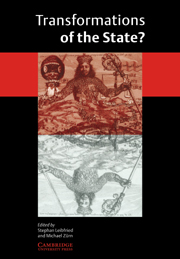Book contents
- Frontmatter
- Contents
- A new perspective on the state
- The modern territorial state: limits to internationalization of the state's resources
- 2 The monopoly of legitimate force: denationalization, or business as usual?
- 3 Globalization and the transformation of the tax state
- The rule of law: internationalization and privatization
- The democratic nation state: erosion, or transformation, of legitimacy
- The intervention state: the shifting welfare component
- Index
2 - The monopoly of legitimate force: denationalization, or business as usual?
Published online by Cambridge University Press: 04 August 2010
- Frontmatter
- Contents
- A new perspective on the state
- The modern territorial state: limits to internationalization of the state's resources
- 2 The monopoly of legitimate force: denationalization, or business as usual?
- 3 Globalization and the transformation of the tax state
- The rule of law: internationalization and privatization
- The democratic nation state: erosion, or transformation, of legitimacy
- The intervention state: the shifting welfare component
- Index
Summary
As Max Weber and many others in his tradition have argued, the monopoly of the legitimate use of physical force is the core of the modern state. What counts here is not the frequency of the actual use of force but the fact that only the state has the legitimate right to use such force. The military and the police are the most concrete expressions of this monopoly. In recent decades, the use of the military and the police has been subject to external challenges – ‘globalization’ – and new ideas about police and military intervention. Although at an operational level the state retains full control over the actions of the police and military, the conditions for their use are increasingly shaped by institutionalized legitimating ideas.
The monopoly of the use of physical force – functions and form
For Max Weber, the monopoly of the legitimate use of physical force – henceforth ‘monopoly of force’ – was the feature that distinguished the modern state from all other forms of political organization. It has two elements – the monopoly of the use of force and the legitimacy of its use. The monopolization of the means of force by a single centre is the result of a long evolution. It took centuries for the state successfully to centralise control over the means of coercion against all major rival groups. This monopolization has now become a generalized expectation.
- Type
- Chapter
- Information
- Transformations of the State? , pp. 37 - 52Publisher: Cambridge University PressPrint publication year: 2005
- 1
- Cited by

